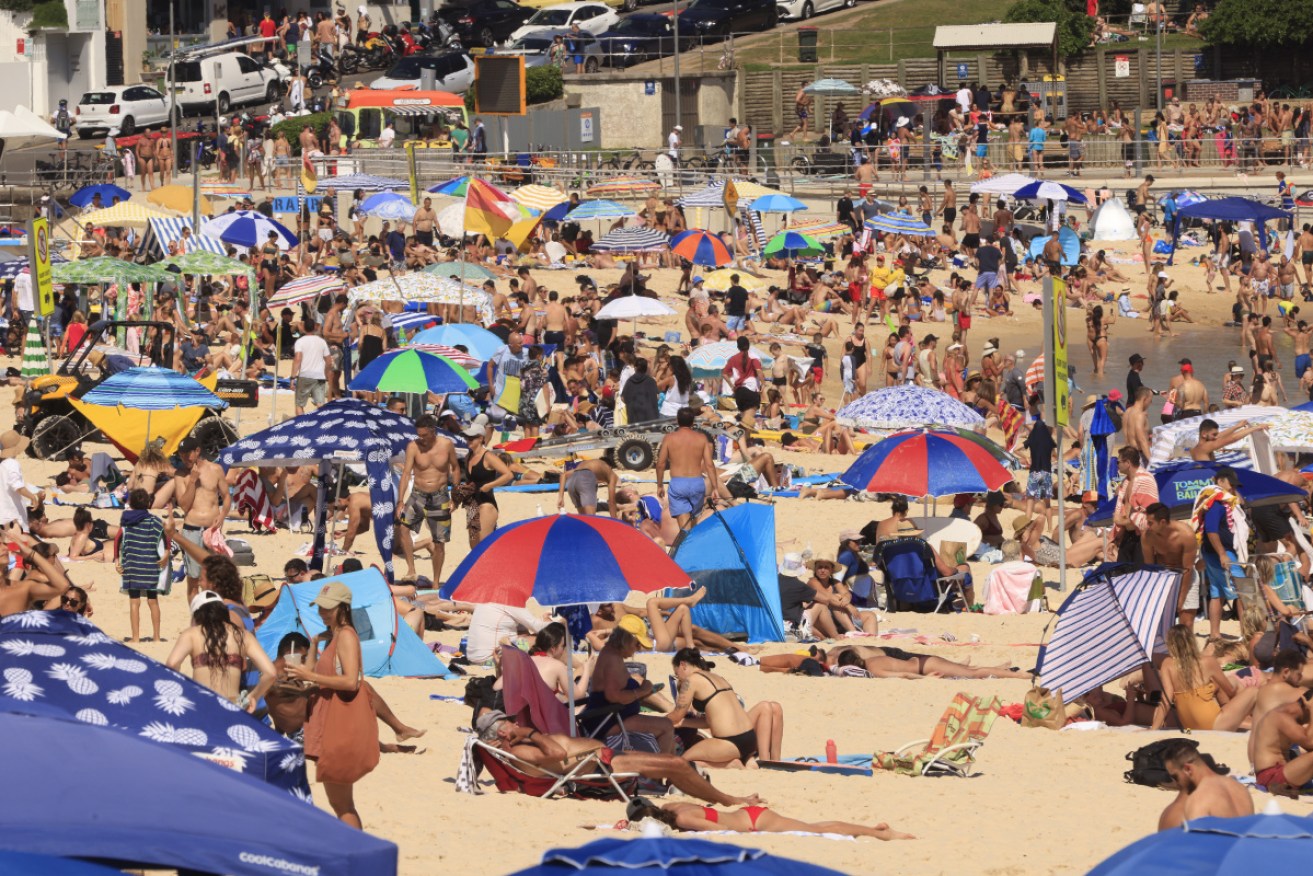Mystery coronavirus cases detected in NSW


Skin cancer rates remain high and sunburn is all too common in Australia. Photo: Getty
Upcoming New Year’s Eve celebrations in Sydney are a risky situation that could hurt NSW in the fight against the coronavirus, an epidemiologist has warned.
It comes as NSW Premier Gladys Berejiklian announced new restrictions on New Years Eve revellers.
Contact tracers have managed to track and trace more than 120 positive cases, but at least six people who had no clear link to the Avalon cluster have left authorities concerned.
Another source of worry is a Christmas Day beach party at Bronte Beach that NSW Health Minister Brad Hazzard called an “appalling” display.

NSW Premier Gladys Berejiklian speaking during a COVID-19 update press conference on Sunday. Photo: Getty
- A Bondi man, who investigators now believe was a false positive, though this has not been confirmed
- A man who was in the Chifley Square/MLC/Circular Quay area of the CBD. He was in the CBD at the same time as other confirmed cases, but they did not cross over at any time
- A man who commutes to Manly for work. NSW Health is checking with Opal to see if he had any crossover with infectious people on his bus trip
- A 20-year-old man who works at the Belrose Hotel
- Two patient quarantine/transport workers and a close contact.
Professor Marc Pellegrini, the joint head of infectious diseases and immune defence at the Walter and Eliza Hall Institute of Medical Research, said the mystery cases were not necessarily a sign of undetected chains of community transmission.
“The numbers have all been in the single-digit figures,” he said.
“So if you’re really missing large numbers of people that were explaining potential cases that had no obvious contacts, then you’d expect the numbers to be escalating, but they’re not. They’re staying relatively stable.”
Professor Pellegrini, also the institute’s COVID-19 research lead, said the number of Sydneysiders being tested was “reasonably reassuring”.
During last week’s testing blitz, which ended at 8pm on December 26, more than 253,230 people in NSW were tested for COVID-19.
Ms Berejiklian said close to 70,000 tests were recorded in the 24 hours to 8pm on Thursday night – the state’s highest number yet.
“I’m very impressed by the way Sydney has been able to handle this,” Professor Pellegrini told The New Daily.
“I don’t want to jinx them, but I certainly think they’ve done this incredibly impressively given they haven’t had a massive shutdown of everything.”
But NSW is not out of the woods just yet.
“You’d be naive to think New Year’s Eve is not a risky situation,” Professor Pellegrini said.
“You have to be incredibly confident in the people, particularly making sure people who are not feeling 100 per cent don’t go out.
“That’s always really tricky to navigate, as people are pretty desperate to celebrate the New Year because it’s been a very tough year for many people.”
By New Year’s Eve, we’ll know if the coronavirus spread among loved ones visiting each other – or partying at Bronte Beach – on Christmas Day.
Bronte beach parties… not so much social distancing going on… pic.twitter.com/3StFoCaWB8
— @[email protected] (@p_hannam) December 25, 2020
That’s because the incubation period of the virus is usually about five days.
“If, in five days’ time we see it start blowing up, then we’ll know,” Professor Pellegrini said.
The stay-at-home order imposed on residents of Sydney’s Northern Beaches has been reinstated after the conclusion of Christmas festivities.
Indoor gatherings are banned again, but outdoor get-togethers of up to five people on the northern end of the peninsula are permissible, as well as outdoor gatherings of up to 10 on the southern end.
People may neither enter nor exit the local government area.
For the rest of Sydney, as well as Wollongong, the Central Coast and Blue Mountains, 10-person private gathering restrictions again apply.
AAP reports the Avalon cluster in NSW now totals more than 120 coronavirus cases after the discovery of seven new locally-acquired cases.
One of the new local cases in NSW, a firefighter who works at Crows Nest but lives on the northern beaches, is still under investigation.
Three fire stations have been closed for deep cleaning and Fire and Rescue NSW is working with NSW Health to identify all contacts.
Victoria recorded its 58th consecutive day without a locally-acquired COVID-19 case, with one overseas-acquired infection discovered in hotel quarantine.
There are currently 10 active COVID-19 cases in Victoria, nine of which are in hotel quarantine, with the 10th in isolation at home.








